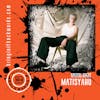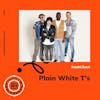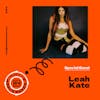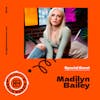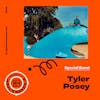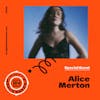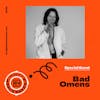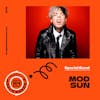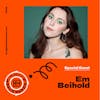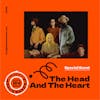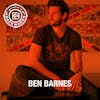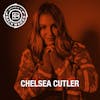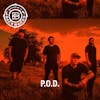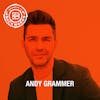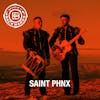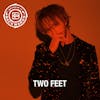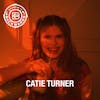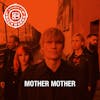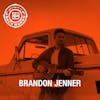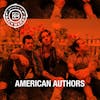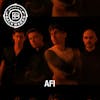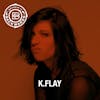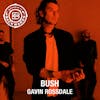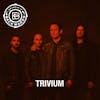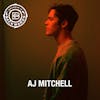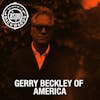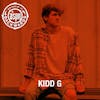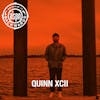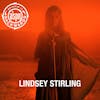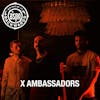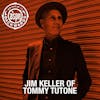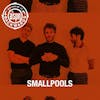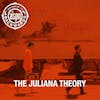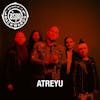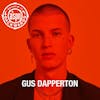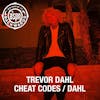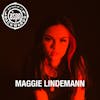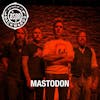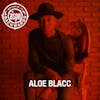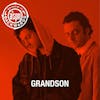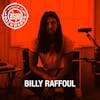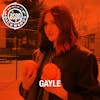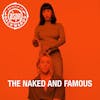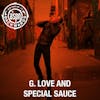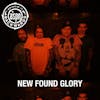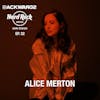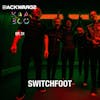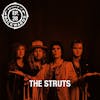Interview with Bryan Senti
We had the pleasure of interviewing Bryan Senti over Zoom video.
Rising composer and violinist/violist Bryan Senti’s new album Manu is out now on Naïve Records.
Manu is the first crossover album for the classically trained Senti, a...
We had the pleasure of interviewing Bryan Senti over Zoom video.
Rising composer and violinist/violist Bryan Senti’s new album Manu is out now on Naïve Records.
Manu is the first crossover album for the classically trained Senti, a first-generation Cuban/Mexican- and Colombian-American, combining western neo-classical traditions with the Latin American folk music his parents grew up with.
Unique among classical releases, the parts of Manu were recorded individually, enabling the record to be released in Dolby Atmos as well as with a traditional audio mix. This unusual recording process gave engineer Francesco Donadello a unique opportunity to push the mixes, creating an illusion of three-dimensionality that plays on the psychedelic character of the music.
In 2020, Senti turned 38 and had his first child. “When I thought about the stories that I wanted to impart to her, the things I wanted her to learn from me, I thought back on what things I had learned as a child, or wished I had learned,” he says of writing Manu. “What I wished I had learned was an ability to cherish both a Hispanic and American identity equally.”
Bryan Senti is based in Los Angeles; recent collaborations include projects with Dustin O’Halloran and Peter Gregson for Deutsche Grammophon. His film and TV career began with Michael Almereyda’s Experimenter in 2014 and since then he has worked on multiple films and TV shows including the BAFTA winning series “Save Me” (2021) by Lennie James. Currently he’s scoring the BBC 3 musical “Mood” by Nicôle Lecky.
In addition to working on classical music, Senti’s experimental pop project Ex Mykah is signed to the London-based Kowloon Records and his LP 16, 17 was released in 2018. He also collaborated with Mark Ronson on his production Carbon Life, performed by the Royal Ballet, and has toured and recorded for the Canadian singer-songwriter Feist.
Senti received a master’s in music composition from The Yale School of Music in 2009.
We want to hear from you! Please email Tera@BringinitBackwards.com.
www.BringinitBackwards.com
#podcast #interview #bringinbackpod #BryanSenti #Manu #NewMusic #zoom
Listen & Subscribe to BiB
https://www.bringinitbackwards.com/follow/
Follow our podcast on Instagram and Twitter!
https://www.facebook.com/groups/bringinbackpod
We'd love to see you join our BiB Facebook Group.
Hello, it is Adam welcome back to bringing it backwards! A podcast where both legendary and rising artists tell their own personal stories of how they achieve stardom. On this episode, we had a chance to hang out with Bryan Senti over zoom video. Ryan was born and raised in New Jersey, and he talks about how he got into music. He started playing music at a very, very, very early age. At three years old, Brian was playing the violin and played that four years through high school, attended college split. The violin attended Yale for his masters in music composition. He talked to us about working with Dustin O'Halloran scoring different films and television shows. 3 (2m 8s): He's worked with Feist and mark Ronson. So we talk about that. And around the time the pandemic hit, he decided to dust off the violin. He hadn't been playing it for a handful of years and he took it out and started writing what became his real first record under his name, Bryan Senti. And it's called Manu. You can watch our interview with Brian on our Facebook page and YouTube channel at bringing it backwards. It'd be awesome if you subscribe to our channel like us on Facebook and follow us on Instagram, Twitter, and tick-tock at bringing back pod. And if you're listening to this on Spotify, apple music, Google podcasts, it would be amazing if you follow us there as well, and hook us up with a five star review. 4 (2m 49s): We'd appreciate your support. If you follow and subscribe to our podcasts, wherever you listen to podcasts, 3 (2m 55s): We're bringing it backwards with Bryan Senti. Hey, what's that Ryan? How are you? 5 (3m 2s): I'm good. 3 (3m 3s): I love the setup. 5 (3m 4s): No, thanks. My home studio. 3 (3m 9s): Amazing man. It's amazing 5 (3m 12s): Goodies that go back over there. 3 (3m 14s): Oh, wow. Yeah, you got a ton of stuff going on there. That's amazing. 5 (3m 18s): Thanks dude. 3 (3m 19s): Cool. I'm Adam. And this podcast is about you and your journey in music and how you got to where you are now. And we'll talk about the record as well. 5 (3m 28s): Yeah. Nice, good. I didn't even realize that this was also Nvidia. There you go. 3 (3m 37s): No, you look great. And the room looks sick as well as we discussed. 5 (3m 42s): Awesome. 3 (3m 43s): Awesome. 5 (3m 43s): Yeah. 3 (3m 44s): Well, I guess start off by telling me, where were you born and raised? 5 (3m 48s): I was born in Teaneck, New Jersey. I grew up in Paramus, New Jersey. Yeah, kind of, yeah, a normal suburban New Jersey existence. Okay. Yeah. 3 (4m 5s): Well, what about music? How did you get into music? Do you come from a musical household at all? 5 (4m 8s): Yeah, my father, who was a minister, he, he was a singer, so, so yeah, he, you know, and we kind of grew up going to the church or I grew up going to the church with my sister and yeah. So we were kind of like required to sing into, to play the entire time. And my father was also kind of keen on me being a violinist. So I, I started playing violin at three. I remember a time when I didn't play violin until later. 3 (4m 43s): Oh my gosh. Three years old. That's so young. I'm amazed. You could like, hold it up and play it. I mean, I have a six-year-old that's why I'm just like shocked that three years old. 5 (4m 56s): Yeah, no, I'm kind of sh I, you know, when I think about it, well, my, my parents were very, very strict, you know, I think strict in a way that I don't think we're as strict generation now I have a two year old. So being that strict either, but yeah, they got me to, they got me to play the violin. I mean, kids right now. They're like they're wearing masks, which we didn't think that Pete like wear a mask. So it's interesting. Like, I suppose if you do, if you do, you know, assert yourself, they will follow your direction. 3 (5m 33s): That's a good point. That is a good point because yeah, 5 (5m 37s): So, but yeah, that's how, that's how I got my star. And then, and then, you know, eventually after taking a bunch of private lessons, ended up going to Manhattan school of music, preparatory program 3 (5m 50s): At like 5 (5m 52s): 12. So 3 (5m 53s): Did you do that as a violin player? Okay. And so that was like your main instrument all the way through high school. And 5 (6m 2s): That was the main instrument. I mean, I also played saxophone. I also sang choir. I was in the wind ensemble and played jazz, but mostly it was violin. And then when I finally got to 17, 18 years old, I'm like, I kind of have like my, my first like early life crisis, you know, where it's like, the pressure of this instrument is, yeah. I don't, I don't know. I don't know if I want that to be, you know, at that point in time, I didn't know if I wanted that to be a part of my life, you know, that kind of level of stress. And I guess, I, you know, again, I'm old enough where it was like before beta blockers and before, before the, is it done? 5 (6m 47s): What's the name of that author who like taught at, from Julliard, but this, you know, before, like all these books came out on like performance theory, essentially, like be the best performer you can be in, calm down. You know, I, I feel like I grew up at the time where it was just like, you gotta be a rock star, rock rockstar, shut up. Don't complain. 3 (7m 11s): Sure. 5 (7m 13s): That didn't really work that well for me. So that's, that's why my last year I started studying composition and threw myself into composition. 3 (7m 23s): And you've been doing that for a while. I mean, you score a bunch of films and recently television shows. 5 (7m 30s): Yeah. Yeah. You know, you know, I always, I guess when you're, when your violin is too, you know, I just figured that I should have some sort of skill at that at composition. I've played enough pieces in my life and, and I'm, I'm always kind of a little bit late to the game with certain kinds of things, but I, I kind of fell in love with composition after starting to study it and doing it and do it. And so, so yeah. Now it's, yeah, I've just, I guess I've been composing a long time, but I feel like just recently, and also with this record, I'm starting to like, realize like, why I'm doing this, you know, rather than just kind of like, as an exercise of skill, but that's my bath. 5 (8m 23s): So, but yeah, yeah, no, I've been doing it a long time. 3 (8m 27s): So you, you, you, you went to obviously college for this, and then when you finished school, what what's like, what's the first step you do you just try to get like hired by a company that you can write for? Or like, are you like playing in, you know, 5 (8m 42s): Well, this is like 3 (8m 43s): Live theaters, stuff like that. 5 (8m 45s): Yeah. It's I mean, this is the thing. I mean, I, I don't think, and I'm sure the education and pedagogy has changed, but you know, the classic phrase that like no one really prepares you to be like an artist in school or it's not a really good training for, for working in the professional world. I think that definitely applied to me, but in ways that I didn't really realize until much later, but yeah, I know essentially I was in my second year, I guess, of grad school at Yale and I had to become, you know, a little friendly with Nico Muley and he had suggested that I help Rufus Wainwright with his opera pre-Madonna and, you know, at that moment in time coming from my background, which is like, you know, my PA, like I said, my, my father was like a minister and my mom was a dental hygienist, very working boss, you know, and maybe different than a lot of the people who go to yell in general and composition in general, I was like, wow, a job, you know, like, sure. 5 (9m 56s): Like that's pretty great. So, and, and also at that time, too composition, I think as like a formal practice was changing, we were still, I, I took it that interview at Julliard, but I ended up going to Galen and get into Julliard, but I took an, I took a meeting with Samuel Alber and he was totally shitting on Philip Glass, which I thought was like really, really strange considering cold glass went to Julliard, but it was indicative of this mindset of, of, you know, composition faculty that like, they were still holding onto like old concepts of what classical music should be. 5 (10m 45s): And, and then you have somebody like Niko Muley come around, who is collaborating with New York and Anthony and the Johnsons, and kind of like merging these two worlds and classical music was starting to like, I mean, you know, it'll be 3 (11m 5s): Almost mainstream, kind of, 5 (11m 8s): It was going through this like tectonic plate shape shifting, you know, and I guess I was kind of confused as to I had a hard time seeing myself go through, you know, being like, well, I didn't have the money to do it either. Like just locking myself in an apartment in Brooklyn and just like trying to get commissions. And I just didn't feel like I could take it, could do that with my life. Cause I just didn't come. My parents didn't come from money and I feel like, I felt like I needed to honor them and, and like, and, you know, make a better living than that. So I didn't allow them. 3 (11m 46s): That'd be a difficult, that'd be a difficult thing to do anyway. Right. I mean, how are you going to, you have to reach out to them if you're not getting, you know, getting people to, to want to hire you, then you're just kind of sitting there waiting around right. At that point. You're yeah. 5 (12m 3s): There's no funded or, you know, which I think a lot of people are, you know, 3 (12m 10s): Especially if you're living in New York, 5 (12m 11s): Right? Yeah. Especially if you're living in New York, you know, or you, you try and finagle it through, through a teaching job. And so anyway, with the confusion of like what an actual composition career would look like, I was so grateful for Nico to reach out to me and to put me in touch with Rufus. And I proceeded to go on, you know, a two to three or two to three year relationship with, with Rufus, like helping him out on stuff and, and, you know, finding a lot of meaning in that. And then when I finally got off the road for him, with him, I was, you know, again, really confused as to what to do. So I kind of fell into, to advertising a bit and worked in, you know, with a company called with human and started some music production companies. 5 (13m 1s): And, and yeah, no, I mean, I kind of forfeited my, my, my badge and gun by forfeited my artist card for a long time after that. And as I kind of became more financially secured and I, then I kind of like found where that locker, where that artist's card was start a store and try to collect it back. 3 (13m 32s): What, when, when did the enemy, when would you say that that happened? Was that when you started to, you know, do the scoring and composing on different phones or like, is this even later down the line? 5 (13m 44s): This is, you know, what I, I would say would be, it would be through the collaborations that I had with Dustin O'Halloran. Yeah. I, I I'm very indebted to that guy, but essentially I was kind of, you know, just meandering through life, trying to, you know, just making a living and starting a family and, and, you know, being kind of comfortable with like kind of a more, I'm just gonna put my head down and work kind of blue collar approach to like music making. And then, you know, I met Dustin and here's this guy who also doesn't come from much and just the approach to everything in his life with, with, with artistry and with sensibility. 5 (14m 37s): And, and I was just like blown away by this guy. You know, we didn't have like a formal musical education either, but you know, when on the road with D VIX and then started making his piano records, that essentially led him into film. And, and yeah, and then he, he kind of was comfortable with making classical music without, with kind of, without the feeling, the overwhelming weight of history that like, I think a lot of classical music composers kind of go through, they're kind of, you know, you're always trying to, I don't know, you're, you're, you're trying to live up to the, to the great old, you know, European master essentially fair. 5 (15m 24s): And, and this guy didn't have any of that. You know, he was kind of more rock and roll about it. And I think a lot of, you know, people like him have kind of changed where classical music is, you know, it's, it's kind of lost some of that stodgy, overly reverent kind of ethos, and now is much more free-spirited and much cooler than it was back in the day. So, you know, we are a lot of people like Dustin and all, all of us and meals from, and to so many people and Nico. 5 (16m 9s): So, but anyway, through him, he also was like, Hey man, you know, do you play an instrument? And I was like, yeah, I play violin. But you know, I haven't really taken it that seriously since I was 18. And he's like, dude, just pick up your instrument. You know, it's, it's about, you know, having like a, a unique perspective on, on your instrument, you know, like you don't have to, you know, it's not like Dustin plays like lists, you know, it's like, but he has such an, a beautiful and such a unique touch on, on the piano. And he's like, just, just find your voice on that instrument. You know? And from there, I was like, I, you know, I picked up dusted off this instrument. 5 (16m 53s): I hadn't played in, you know, seriously in a while and, and, and started playing it again. And I was like, oh shit, man. Maybe I do have a perspective on this thing. You know, especially after all these years, you know, I've worked in pop music and worked with mark Ronson and worked with random people all over the place. Like, I think I can take all the things that I've learned and reapproach this instrument. And so after collaborating with us on some TV shows and suffered for Georgia phone, which was like kind of a kid's dream come true and also kind of just like, wow, that happened. I was like, you know, I actually have like a lot of things I want to say on this instrument. 5 (17m 37s): And I think I have, yeah. Like I think I have quite a unique approach to this instrument. And, and then that kind of inspired me also to kind of look back at my family story and kind of pull in different musical influences. So yeah, that's kind of how I got to here. 3 (17m 59s): Interesting. And so with that, like when do you, cause this is your first, this is going to be your first like project as an artist correctly. 5 (18m 7s): Yeah. Yeah. I have another project as like X Micah, where I'm like doing like experimental pop music, but this is, it was kind of, that's like a, kind of a strange project too, because it's like, I had some sort of like alter ego before I had an ego. Like I never felt kind of like comfortable being like myself, you know, in drag. So, so was like, yeah, now I can, you know, gosh, I'm 39 if I can't, if I can't like put something under my name at this point. And like, I, you know, it's, it's, it's time, it's time to put something under my name 3 (18m 43s): Was there like a, I mean, you talked about finally, you know, dusting off your, your violin and really going back to that and your roots. It was that around like, w like, was there something that you remember that kind of sparked that? Or was it just like, you know, the pandemic kid or like when do you start like really deciding to work on this record? 5 (19m 3s): Well, the record specifically, yeah, it was a pandemic right here. You know, here we are at a moment in time when everything completely stops and, and quite frankly, like, I'm so grateful to it from a career perspective, obviously a terrible event, but from a career, from a career perspective, because I feel like with the exception of the stuff that I was doing with Dustin, I was just kind of on autopilot almost career wise and just, you know, trying to say yes to every gig and not thinking very critically about, about things and, you know, kind of, belying my education blind, my, my deeper opinions about music and art in general. 5 (19m 59s): And then here we have the pandemic and, and I also, right before the pandemic happened, I had my first child on February 10th, 2020. 3 (20m 10s): Congratulations. Wow. That's right before. 5 (20m 13s): Yeah. I mean, things shut down. We had Nico and he got so sick and by the time we recovered from whatever cold that we had, you know, the world had closed and you're just like, should I have had this kid, you know, this is the time to bring somebody into this world. I'm definitely not alone there, but obviously 3 (20m 34s): Not at all, 5 (20m 36s): Definitely grateful she's here and that we're getting through it. But at that point in time, we didn't know if this was like the end, but, but anyway, so had Nika and, and, and the pandemic happens and no work is coming through and it's clear that no work is going to come through. And I just have, you know, the first moment in my life, probably since school where I'm like, well, you know, what does music mean to me? And what are the stories that, you know, that I'm uniquely positioned to tell, because at this point in time, you know, again, being 39, now I'm 39, but it's not just about putting two chords together that you think are cool or having like a cool melody line or, you know, music has to have a little bit bigger meaning now, you know, for me. 5 (21m 31s): So I need to kind of find that story. So, so yeah, I think, I think the first thing that I started to do was essentially just look back on my, on my family. My father had passed away in 2016 and my, you know, both my parents kind of come from like their traumatic stories. And, you know, my father kind of left Cuba and during the, the Cuban revolution and my FA and my mother, her father was murdered in Columbia. And my mother died shortly after and she was an orphan and they have these like very intense traumatic histories. 5 (22m 17s): And here I am being born in New Jersey when I'm, when I was born and going to schools like Carnegie Mellon, Yale. And I always found it kind of difficult just to connect their story to mine. And I think part of that was by design because my parents were part of a generation of immigrants that were constantly saying like, you're American, you're going to live the American dream. Like we brought you here for a reason. They didn't made no attempt to teach me Spanish. They kind of divorced me from, from their, from their history and from their culture because their culture, because their history was there, a specific history was so traumatic. 5 (23m 1s): Sure. Specific history is that unique to those people, but, but that's, that's how they, that's how they dealt with their trauma. And, and also, you know, I think the boomer generation is also, you know, largely on therapize, particularly people who don't come from like a wealthy class also because therapy didn't get as advanced until probably the eighties or nineties either. So, so yeah, my, my parents always dealt with things by like kind of shutting down, not telling stories, but then when you start to have a kid and then you're in kind of a worldwide pandemic, you start, you start, you really want to like connect the dots. 5 (23m 44s): So you want to figure out, you know, you want to go back and, and kind of be able to lean on like a family story or a family history. Or, and it's not that I was able to obviously get that from my father who had passed nor my mom who is, you know, relatively on therapized or on therapy, never went to therapy, but I tried to do it through music because we, I was listening to some of this, you know, we were listening to traditional music when I was younger and as a kid and, and I, and I wanted it. Yeah. Like I kind of wanted to bridge that gap between those two different worlds. And then I realized that like my style of, you know, I have these different kinds of extended extended techniques that could, could kind of help evoke that kind of connection. 3 (24m 35s): Yeah. No, I mean, that's, I like just like hearing your story. I mean, having your parents come here from tra you know, trauma, obviously they come here and then, you know, you're born into, you're born in Jersey, and then I can see what, you know, you're saying where it's like, your parents didn't want to teach you Spanish. Or like, they kind of wanted to just like, put that in the past and be like, here's the law. Like, you're going to be able to do whatever you want. You're here in America or whatever. And now you're looking back being like, well, what ha you know, that's where my heritage came from. Like, how do I tie into that? And then with the record, you're, you're trying to, yeah. You said bridge the gap between the two. 5 (25m 14s): Yeah. And there's so much lost when people do stuff like that. I mean, there's so much, there's so much beauty in being Hispanic and, and I am Hispanic, No matter how, you know, how divorced you keep somebody from a culture, it's like, you know, if, if you look Hispanic, if you look Chinese, if you look like you're from, you know, you are, and even if you don't look like you are inside you, you have, you have that story inside you. And I do think we, I also do think that the trauma of, of your parents and maybe even the trauma of your grandparents, you carry on some level. 5 (25m 54s): So, so yeah, that, that was like a big, a big part of it. And I, you know, and, and I think another point that's related to that is just because there's so much beauty in it. You want, you want to find, you don't want to like, look at part of who you are, is ugly, you know, and, you know, you want, you kind of, you, you want to make good on like all the aspects of like your, your personality and your history. And so I, I had to make that something worth admiring and worth triumphing. And on some level, you know, that my Hispanic area, that was essentially another, another kind of experience that kind of helped us it's like, that was like, maybe this a little strange as that before I had a kid, my production partner, Justin had, had invited me to do like an Iowasca ceremony, which 3 (26m 58s): How interesting. Okay. 5 (26m 59s): Yeah. Which, you know, I think it was a deeply moving, you know, not that it's something that I would recommend to everybody, but, but, you know, it w it was such an intense, like, you know, kind of psychedelic experience. And when I went through it, it kind of, I don't know, for some reason it gave, you know, it gave me some peace and, and made me feel that I could, when I, when I looked back on that experience, it made me feel like I could also connect the dots between, you know, indigenous folk music and Western classical music, the music that I had grown up with in a, in a psychedelic state, all things are kind of equal in a way, you know, you don't, you don't question the goat moving, you know, like in a Boone, well, film, you know, don't question like, you know, the goat, the goat moving across the floor or whatever. 5 (28m 1s): And I think I needed that permission in a way, because I think again, with my classical upbringing and also with the, the mantra kind of dictated from my parents, I was like, oh, these things, don't, you don't put these two things together, you know? And I heard a lot of that actually in composition school, like, oh, these things don't belong Here now. I'm sure no, one's given that. And no one's giving that instruction, but like, you know, in the nineties, 3 (28m 34s): You even still kind of hear that with people that have been classically trained or they're really yeah. In like music theory or just not having, because I've spoken to a lot of musicians and you have the people that have been trained that way, and they know what notes should go with what, and like, when it comes to writing and composing, that's where they go. But somebody that has zero knowledge in music theory might just throw a couple of chords together and be like, well, that sounds really cool. If you come from the other side of it, you'd be like, ah, that there's no way that would, you know, should work. But it's, it's kind of a weird juggling thing. 5 (29m 9s): It's weird. It, well, it's just, it's arrogance right too. It's us, if you think, you think you hold the secrets to the music and it's, and it's an over-emphasis and over reference of like Western music history, you know, and just the power of like, you know, white European composers, it's like, 3 (29m 30s): It's all, you know, yes. Objective 5 (29m 36s): And, and just as powerful and just as amazing. And in some cases more amazing and more powerful. And, and, and yeah, but sometimes you have to, you have to find a way to give yourself permission, you know, as I always listening to, or not listening, I was reading this, like this interview with our rose who's like I went to the, this past weekend to the movement festival in Detroit. Do you know about, 3 (30m 7s): I've heard of it. I've never been by noted is 5 (30m 10s): Techno festival. I just had such a moving, moving experience, watching a set from this, this artists are rose and she, you know, went to mills college. And, and I think, you know, I grew up in like doing electronic music and then found themselves going back to, to school. And there are so many, you know, really creative and avant-garde professors that were teaching at, at mills college. 5 (30m 50s): But, you know, I think she wanted to, or they wanted to, you know, go, you know, find, you know, essentially like study classical music to see if that's something that they want it to be, to be a composer. And eventually, you know, learned all of these, you know, it was like studying all these amazing techniques, but then, but then kind of like rediscovered a love for techno and like brought all of those, you know, some of the things that they learned back into techno and now is making the most amazing techno ever mostly experimental and progressive and just totally moving technique you've ever heard. 5 (31m 33s): And it's, it's, I don't know. I saw a little bit of a journey that this person was going through and, and in some ways it seems like they also needed permission, you know, in a way, or they were, they were searching for that permission in a way, and then found that like the permission was, was there within themselves, you know, and I don't know, I could really relate to that journey because, because, you know, at least with money, I think there's no way I could've written that record 15 years ago. You know, it's just, I would have felt like, oh, I, I shouldn't, I don't, I don't know if I can tell this story. I don't know if that, like, if it feels right to bring in, you know, you know, some indigenous folk material into classical music, these things, you know, should remain separate, but it's, but then you give yourself permission and then you're on the, you know, you're, you're on the other side of a, of a conversation. 5 (32m 29s): So, but anyway, 3 (32m 33s): No, no, that's amazing with this record, did you record it in that room? You're sitting in now? 5 (32m 39s): So yeah, I recorded, I recorded it all here in the beginning and, and then worked with this cellist. No Hoffeld and, you know, it was just essentially doing everything remote and, and then, you know, working with Justin Moscovitch, he's like, dude, like, let's do you to do this is good, you know, but you got to do this like legit and I, it was also just recording at 48 K and just kind of, you know, being messy about it essentially, because I think if I, if, if I was to kind of organize about it in the beginning, I probably would have never finished either. 5 (33m 25s): And so he kind of pushed me to rerecord everything and in 96 K and rerecord it at igloo. And then, and then there's one orchestral part that's recorded by Prague, the orchestra there. But yeah, but I think one, one thing to mention regarding the recording thing is that again, having gone to classical music school and being very comfortable, like working in Sibelius and in score, I just knew from the beginning that if I just wrote, if I wrote this stuff in score, I'm going to screw the whole thing up, you know, it's going to lose all its vibe. 5 (34m 7s): And the vibe of this, of some of the spoke music is completely opposite. What's achievable in a score normally, and it needs to have an improvisational kind of, you know, capricious almost like feel to it. And so I was like, I'm gonna, I'm gonna make this piece. I'm gonna, I'm gonna make it by, by just recording every single part individually, which is one thing if you're making pop music, but it's a different thing if you're trying to make something that's, I mean, there's a pop aspect of this music too, but right. But it's compositional. 5 (34m 48s): And I think to keep everything, I mean, I shorthanded some notes to myself, mostly in just words, but I think it was an interesting thing to like essentially compose by recording things that are as innate as like the last track of that record via. But I had done this one track before for a compilation record on K seven called Tiran. And, and I tested that theory out there. And I kind of, in my mind was just the quading, the idea of like recording each individual part as like one brush stroke, you know, like a painter only has one brush stroke at a time. 5 (35m 37s): They have like, you know, the retrograde plugin on Sibelius to retrograde a, you know, right. So they, they, they have to go one brush stroke at a time. And I was like, well, I'm going to go, you know, it's also a brush, right. It's like, <inaudible> at a time and, and in a way, and I think it's very, it's very palpable in Toronto, but it's also pal palpable in this record too. There's like kind of a weird painterly feeling to it. And yeah, it's just, you know, it's just interesting to kind of like imbue a piece of music with that kind of a vibe, rather than again, from a compositional school perspective, the kind of trying to be God compositional, design process, everything is figured out. 5 (36m 35s): I can show you the mathematical algorithm that I based on. And if you don't like this music, it doesn't matter because it's based on math. 3 (36m 44s): Right. Right. And here's the notes and you can play it exactly how I want it 5 (36m 48s): Exactly like this. And you see, there's a second theme to see there. It's right there. 3 (36m 54s): Yeah. 5 (36m 56s): Development and it's and yeah, fuck that where we have enough of that. We just have a lot of, you know, it's still good, but there's other ways there are. 3 (37m 11s): Yeah. It sounds like, yeah. Having that kind of like, like you said, giving yourself permission to kind of unlocked a lot of things for you and, and creative creatively, being able to just put this record together as you want it and not think of all of the, almost like the schooling that you had learned and what you had been taught, you know? 5 (37m 32s): Yeah. I don't know, man. I haven't really had to really unlearn a lot of that stuff. It's like the church. 3 (37m 38s): I mean, it'd be hot 5 (37m 39s): Just like having gone to church my entire life as a kid, too, I was like, oh shit. Maybe, maybe that's not good. But you know, maybe this thing that I thought was like more or less like behavior and the church is not serving me very well out inside in the real world, you know? And it's the same thing with gospel music school. It's the same thing. You're like, oh, this, this thing that I thought was like a rule in love, music creation is it's like, it's very much not a law called this whole like schematic that you have for how you're thinking about music is also wrong. And so you have to kind of be born again in a different, you know, kind of reconstruct your whole system of ethics or reconstruct your whole system of music making. 5 (38m 25s): And once you do that, you're probably going to be a happier person and also a better artist. 3 (38m 30s): No, for sure. And I think that goes with, yeah, like almost anything, if you have, didn't doing something a certain way for such a long time and it's like, technically the correct way to go back and try to learn it differently or try to do something differently that you like against what you had been taught. It's like, yeah, ridiculously, I'm just thinking like I grew up skateboarding and my son was trying to learn and he was doing something wrong when he's trying to do this trick. And I, because I had been doing it for so long, I couldn't replicate what he was doing because my, the muscle memory was there. Like I knew what he was doing. Cause I used to do the same thing. And it was like, I've tried to explain them, like at one point it will just click, but I can't like go back and show you. 3 (39m 11s): It was weird. Like, I, I felt like it was hard to do something that was, is like the natural thing you would do when you're learning. Once you learn it, it's like, oh, I can't go back. And like unlearn what I did to show you how I got to where I was. 5 (39m 25s): Yeah, yeah. 100%. Yeah. It's 3 (39m 29s): Fascinating. 5 (39m 30s): But, but hopefully with skateboarding you can kind of, you can kind of be like, well now I'm a dad. That's okay. I don't need to, like, 3 (39m 38s): I was just trying to like try to relate to in some way, like, I couldn't know what other way to, like, 5 (39m 43s): It's actually a good analogy because the thing is, is that I was like, it was either change or die. You know what I mean? It's like, wow, this is not serving me. I better like, figure out another way to approach this. Otherwise, you know, you're not a composer anymore, man. Like you're, you're not going to be writing any music anymore because like you you're, you're stuck, you know? And so for me it did, it did feel like change or die, you know, but, but hopefully with skateboarding you can, you know, on a long board going down, you know, in Venice and just being in that non-performing most crazy. 3 (40m 26s): Exactly. Exactly. But yeah, it's just, yeah. Crazy to think. I mean, to unlearn something and kind of redo it the, a totally different way or rethink a different way, but I bet you a lot of that, I mean, obviously all that stuff you learned and the technical aspect of it all, it makes things like scoring television shows or film so much easier for you. Cause you could probably hear like, oh, this part should have something that sounds like this and you kind of know exactly where to go or am I wrong with that? 5 (40m 60s): Yeah. I, I think what it is is it's, it's one, it's one toolbox and it's good to have a toolbox. You need a toolbox, but at the same time, I think it really is the fallacy. You know? I mean we have to tear it all down, you know what I mean? I think it really is a fallacy to be like, oh, you know, I, I know all the Western Canada music, I'm going to be great at scoring your film. It's like maybe, maybe not. <inaudible> what I want is just some, you know, crazy experimental electronic artists to do something that's completely against picture, you know, completely against the drama. 5 (41m 45s): Like yeah. And you know, unfortunately like there are no real rules, you know, we are living in this like subjective space, you know, and, and we're trying to, you know, we're trying to make art here. We're trying to create something new. I'm going to, you know, if you were born in 1850 and there was filmmaking back then, which there wasn't, then you'd be great at it. 3 (42m 7s): That's a great point. 5 (42m 8s): But it's 2020 man. Like your, the fact that, you know, Mozart doesn't, you know, a lot of people. 3 (42m 14s): No, no, no. For sure. Even like what you're saying, like, just because this dramatic part of the, the M the show or movie or whatever typically has this sound that goes along with it, that doesn't mean it's right. Or it needs to be done that way. 5 (42m 27s): It doesn't. Yeah. It doesn't mean that. And also going a step further, it's like, let's say you get good at film scoring, you know, good at film scoring, you know, it's like, well, you're probably, you know, like, is that the point of it? You know, you know, I don't know if you ever want to be that good at film scoring. I know what you want to be always discovering something and always trying something new and pushing the art form. If everything sounds like it's the score for CSI then yeah. Technically you're a good TV score, but you're not going to make like a very interesting show. Nope, no offense to the person who scores CSI. 3 (43m 8s): Right. 5 (43m 10s): That applies to that person too. I'm sure they feel the same way. Like here you are, you know, in season 1 billion of the show, it's like, can we push, can we push this? Can we do a little something, a little different, you know? 3 (43m 22s): And then Dick Wolf's like, no, exactly. As I had for the first show, 5 (43m 31s): I had a second when I worked for Mike posts or like I did, I won this, like I didn't work. I did well. What was the name P carpenter, BMI fellowship back in the day. I don't even think they have this BMI fellowship anymore, but I got to sit in and like spend a couple of months, like post and see how it works. And honestly, when you're a part of something so transformative like that, you know, and he's such a transformative person himself, that's just a blessing. Right. You know, it's just an amazing thing to be a part of it. But I think even a person like him, you know, when he's doing something else, he wants to try something different, you know, music is about evolution and, but yeah, it's, there is something comforting about the fact that like, when you see a law and order episode, it's law and order. 3 (44m 19s): Right, right. Exactly. You're like, I know the theme song. I know they haven't really updated the intro for like, you know, 20 years. But like, that was something like that. 5 (44m 32s): So much respect for Mike posts. I mean, just, you know, when I was, you know, had the joy and honor to see him work and just kind of like old school, he had like a, he had this, you know, like a mini keyboard and just the mirror that was like reflecting back onto, onto the show. And he would just like, you know, score the show like that. And that's 3 (44m 56s): Crazy. 5 (44m 57s): And that's a vibe, you know, throw back like silent film, kind of a vibe almost and such a unique perspective. And, but, but if you tried to copy Mike post today, like no, no. And that's your, and if, and if your God forbid mentioning like Mozart or like classical music, it's like, well, I don't know, man. That's even worse than saying you're going to copy my posts. 3 (45m 28s): Well, thank you so much, Brian, for hanging out with me, man. I really appreciate your time. This has been great. 5 (45m 33s): Thanks, man. No, thanks for having me and yeah. I love your podcast, so 3 (45m 38s): Thank you. I love what you're doing. I love the record. And I didn't know that you, you scored that show for, for peacock. It's called too late. Oh, save me. Yeah. I want to see that, like, I've seen ads for it on my, on my peacock thing. And I'm like, oh, that looks really good. And then now, now I saw that you're scoring. I'm like dumb and I'm in, I've got to start it like this evening. 5 (46m 3s): Yeah. It's such a good show. Very hard though. I mean you have kids. 3 (46m 7s): Yeah. I know. It's, I'll watch it. My wife, we like all that weird, you know? 5 (46m 12s): Yeah. 3 (46m 13s): Stuff like that. The true crime, he texts, 5 (46m 16s): You're scoring those scenes and it's just like this terrible scene, you know? And you're just like, oh my God. And you have to watch it again. Yeah. There's terrible. Is it feeling as terrible as I think it should be like that you feel terrible, you know? 3 (46m 30s): Yeah. I'm excited though. Yeah. I would imagine that. It's you're you think? It's great. 5 (46m 36s): Yeah. That's a good, no, no, I'm serious. That's good TV. 3 (46m 38s): Okay, cool. I'm going to check it out. I'm really excited to 5 (46m 41s): See that TV. So 3 (46m 44s): I definitely eat it 5 (46m 45s): Because I worked on it. I'm just 3 (46m 46s): Saying I was gonna say it definitely. It gave me another reason to be like, yeah, I really want to start watching this. And then I saw that you worked on it. I'm like, okay. Now I know, I know. I know Brian. And he worked on the, on the, on the show. So there we go. I'm going to do it 5 (47m 0s): Genius. 3 (47m 2s): Amazing. Well again, dude, thank you so much for doing this. I have one more question. I want to know if you have any advice for aspiring artists. 5 (47m 10s): Oh, maybe, maybe watch that a Kanye doc. 3 (47m 16s): Hasn't good on now. 5 (47m 18s): I would say, you know, I just started, I just watched like the first episode of it, but you know, obviously we all have opinions of Kanye of recent Kanye, but, but Connie at the beginning and seeing how supportive his mom was and you know, just kind of that push to be different and just that push to be who you are and, and, and not to, not to lose that, you know, is so important. You know, I, like I just mentioned, I feel like I lost that for a decade. So, but you, you know, if you do lose it forever, man, it's going to be, it's going to be depressing. 5 (47m 58s): So you have to hold on to, to what makes you, you and, and, and what makes you unique. And, and I think Oprah might've said too, that all you need in this world is one person who loves you.

Bryan Senti
Composer/Violinist
Bryan Senti is based in Los Angeles; recent collaborations include projects with Dustin O’Halloran and Peter Gregson for Deutsche Grammophon. His film and TV career began with Michael Almereyda’s Experimenter in 2014 and since then he has worked on multiple films and TV shows including the BAFTA winning series “Save Me” (2021) by Lennie James. Currently he’s scoring the BBC 3 musical “Mood” by Nicôle Lecky.
In addition to working on classical music, Senti’s experimental pop project Ex Mykah is signed to the London-based Kowloon Records and his LP 16, 17 was released in 2018. He also collaborated with Mark Ronson on his production Carbon Life, performed by the Royal Ballet, and has toured and recorded for the Canadian singer-songwriter Feist.
Senti received a master’s in music composition from The Yale School of Music in 2009.
Featured Episodes
Here are some great episodes to start with. Or, check out episodes by genre.























